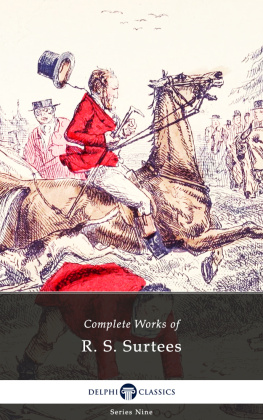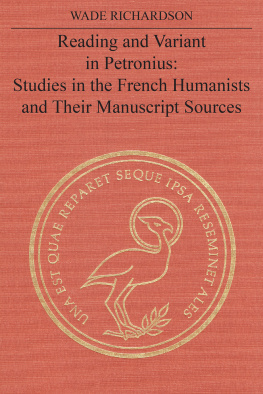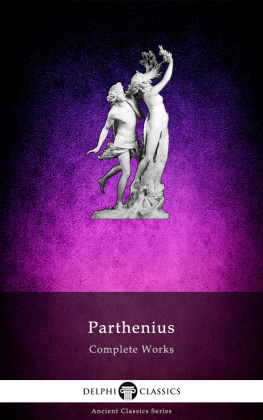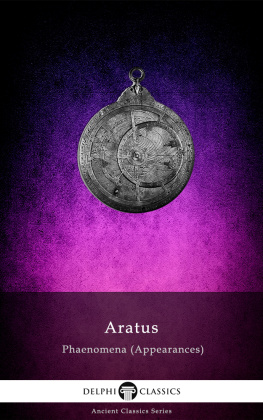Petronius - Complete works of petronius
Here you can read online Petronius - Complete works of petronius full text of the book (entire story) in english for free. Download pdf and epub, get meaning, cover and reviews about this ebook. year: 2015, publisher: Delphi Classics, genre: Detective and thriller. Description of the work, (preface) as well as reviews are available. Best literature library LitArk.com created for fans of good reading and offers a wide selection of genres:
Romance novel
Science fiction
Adventure
Detective
Science
History
Home and family
Prose
Art
Politics
Computer
Non-fiction
Religion
Business
Children
Humor
Choose a favorite category and find really read worthwhile books. Enjoy immersion in the world of imagination, feel the emotions of the characters or learn something new for yourself, make an fascinating discovery.
- Book:Complete works of petronius
- Author:
- Publisher:Delphi Classics
- Genre:
- Year:2015
- Rating:3 / 5
- Favourites:Add to favourites
- Your mark:
- 60
- 1
- 2
- 3
- 4
- 5
Complete works of petronius: summary, description and annotation
We offer to read an annotation, description, summary or preface (depends on what the author of the book "Complete works of petronius" wrote himself). If you haven't found the necessary information about the book — write in the comments, we will try to find it.
Complete works of petronius — read online for free the complete book (whole text) full work
Below is the text of the book, divided by pages. System saving the place of the last page read, allows you to conveniently read the book "Complete works of petronius" online for free, without having to search again every time where you left off. Put a bookmark, and you can go to the page where you finished reading at any time.
Font size:
Interval:
Bookmark:
The Complete Works of
PETRONIUS
(c. 27 66 AD)

Contents

Delphi Classics 2015
COPYRIGHT
Complete Works of Petronius
First published in the United Kingdom in 2015 by Delphi Classics.
Delphi Classics, 2015.
All rights reserved. No part of this publication may be reproduced, stored in a retrieval system, or transmitted, in any form or by any means, without the prior permission in writing of the publisher, nor be otherwise circulated in any form other than that in which it is published.
Delphi Classics
is an imprint of
Delphi Publishing Ltd
Hastings, East Sussex
United Kingdom
Contact: sales@delphiclassics.com
www.delphiclassics.com

The Complete Works of
GAIUS PETRONIUS ARBITER

By Delphi Classics, 2015

Marseille, France Petronius birthplace

The remains of the ancient Roman harbour of Massalia, near todays old port

Translated by Alfred R. Allinson
The Latin novel Satyricon (The Satyrlike Adventures) is believed to have been written by Gaius Petronius, though the manuscript tradition identifies the author as a certain Titus Petronius. Along with Apuleius Metamorphoses , scholars often describe the Satyricon as a Roman novel, though not necessarily implying that is has a continuous narrative. The work has been identified as a Menippean satire, containing a mixture of prose and verse (known as prosimetrum ), featuring serious, comic and erotic subject matter. This genre was made popular by Marcus Terentius Varro (116 BC 27 BC), an ancient Roman scholar and writer, who imitated the Greek Menippus, giving his satires the character of a medley of prose and verse composition.
Satyricon is regarded as useful evidence for the reconstruction of how lower classes lived during the early Roman Empire. The extant text concerns the misadventures of the narrator, Encolpius, who is a former gladiator, and his lover, a handsome servant boy named Giton. Throughout the novel, Encolpius faces the challenge of maintaining his lovers faithfulness, as Giton is constantly enticed away by other lovers. The surviving sections of the novel begin with Encolpius travelling with a companion and former lover named Asciltos, who has joined Encolpius on numerous escapades. Encolpius slave Giton is apparently present at Encolpius lodging when the story begins. He is constantly referred to as brother throughout the novel, indicating that they were lovers.
In the first extant passage, Encolpius is in a Greek town in Campania, where he is standing outside a school, railing against the Asiatic style and false taste in literature, which he blames on the prevailing system of declamatory education. His adversary in this debate is Agamemnon, a sophist, who shifts the blame from the teachers to the parents. Encolpius discovers that his companion Asciltos has left and breaks away from Agamemnon when a group of students arrive. Encolpius locates Asciltos and then Giton, who claims that Asciltos made a sexual advance on him. After some conflict, the three go to the market, where they are involved in a dispute over stolen property. Returning to their lodgings, they are confronted by Quartilla, a devotee of Priapus, who condemns their attempts to pry into the cults secrets.
Although interrupted by frequent gaps, 141 sections of consecutive narrative have been preserved. Speculation as to the size of the original text has estimated Satyricon as large as a work of thousands of pages. A number of fragments are preserved in other authors. Servius cites Petronius as his source for a custom at Massilia of allowing a poor man, during times of plague, to volunteer to serve as a scapegoat, receiving support for a year at public expense and then being expelled. Sidonius Apollinaris refers to Arbiter, by which he apparently means Petronius narrator Encolpius, as a worshipper of the sacred stake of Priapus in the gardens of Massilia. It has been argued that Encolpius wanderings in the Satyricon began after he offered himself as the scapegoat and was ritually expelled.
The date of the satirical novel was controversial in nineteenth and twentieth century scholarship, with dates proposed as varied as the 1st century BC and 3rd century AD, though a consensus on this issue now exists. A dramatic date under Nero (1st century AD) is indicated by the works social background and in particular by references to named popular entertainers, recently revealed in research work.
The incomplete form in which the Satyricon survives has tantalised many readers and, between 1692 and the present, several writers have attempted to complete the story. In certain cases, following a well-known conceit of historical fiction, these invented supplements have been claimed to derive from newly discovered manuscripts, a claim that may appear all the more plausible since the real fragments actually came from two different medieval sources and were only brought together by sixteenth and seventeenth century editors. The novel is remarkable for being a source of scarce information about the language of Romes populace. The Satyricon provides description, conversation and stories that have become invaluable evidence of colloquial Latin. In the realism of Trimalchios dinner party, we are provided with informal table talk that abounds in vulgarisms and solecisms, conveying a precious insight of the Roman proletariat.

A 1688 edition of Petronius work

A 1694 frontispiece illustration for the novel
CONTENTS

Bust of Nero, Capitoline Museum, Rome Tacitus, Plutarch and Pliny the Elder describe Petronius as the elegantiae arbiter (judge of elegance) in the court of the Emperor Nero. He served as consul in 62 AD.

Ancient wall painting believed to be based on Petronius novel
INTRODUCTION
Tacitus writes (Annals, XVI. Chapters 17 and 18-20, A.D. 66): Within a few days, indeed, there perished in one and the same batch, Annaeus Mela, Cerialis Anicius, Rufius Crispinus and Petronius.... With regard to Caius Petronius, his character and life merit a somewhat more particular attention. He passed his days in sleep, and his nights in business, or in joy and revelry. Indolence was at once his passion and his road to fame. What others did by vigor and industry, he accomplished by his love of pleasure and luxurious ease. Unlike the men who profess to understand social enjoyment, and ruin their fortunes, he led a life of expense, without profusion; an epicure, yet not a prodigal; addicted to his appetites, but with taste and judgment; a refined and elegant voluptuary. Gay and airy in his conversation, he charmed by a certain graceful negligence, the more engaging as it flowed from the natural frankness of his disposition. With all this delicacy and careless ease, he showed, when he was Governor of Bithynia, and afterwards in the year of his Consulship, that vigor of mind and softness of manners may well unite in the same person. With his love of sensuality he possessed talents for business. From his public station he returned to his usual gratifications, fond of vice, or of pleasures that bordered upon it. His gayety recommended him to the notice of the Prince. Being in favor at Court, and cherished as the companion of Nero in all his select parties, he was allowed to be the arbiter of taste and elegance. Without the sanction of Petronius nothing was exquisite, nothing rare or delicious.
Font size:
Interval:
Bookmark:
Similar books «Complete works of petronius»
Look at similar books to Complete works of petronius. We have selected literature similar in name and meaning in the hope of providing readers with more options to find new, interesting, not yet read works.
Discussion, reviews of the book Complete works of petronius and just readers' own opinions. Leave your comments, write what you think about the work, its meaning or the main characters. Specify what exactly you liked and what you didn't like, and why you think so.









